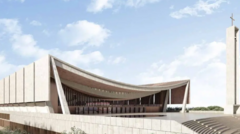Turkey in Ghana's $400 million cathedral project raises questions about funding, public scrutiny, and economic priorities amidst a national crisis.
Inquiry into Ghana's National Cathedral Controversy and Economic Priorities

Inquiry into Ghana's National Cathedral Controversy and Economic Priorities
Ghana's government faces pressure to abandon the costly national cathedral project as new investigations unfold.
In a significant development for Ghana, newly appointed President John Mahama has announced a formal investigation into the contentious national cathedral project, which carries a hefty $400 million price tag. This decision comes as the nation grapples with an economic crisis, prompting rising sentiment against what many perceive as a misallocation of resources.
Former President Nana Akufo-Addo initiated the cathedral project, citing divine intervention in his party's electoral victory in 2016. While it was stated that the project would be privately funded, Ghana’s taxpayers have already contributed roughly $58 million, yet the only visible progress has been a giant hole on valuable land in central Accra, which previously hosted essential state facilities.
Ghana boasts a devoutly Christian populace, with approximately 70% identifying as Christians, and hence the proposed National Cathedral was envisioned as a hub for national religious services, a Bible museum, and a conference center. However, President Mahama's administration is now faced with the challenging task of aligning this grand vision with the realities of a struggling economy.
During a recent thanksgiving service, President Mahama acknowledged the urgent need for an investigation into potential mismanagement of public funds related to the cathedral project, as directed by the Commission on Human Rights and Administrative Justice (CHRAJ). He suggested that the financial demands of such an endeavor must be reconsidered in light of Ghana's current difficult circumstances.
"We can reach a more reasonable figure for achieving such a project and together we can raise the funding for it," he indicated, hinting at possible revisions to both project costs and location. New Finance Minister Cassiel Ato Forson reinforced this shift, asserting the government's commitment to cessation of public funds allocated to the cathedral.
At the same time, Ghana continues to navigate the fallout from a devastating economic crisis—the worst in a generation—which prompted a $3 billion bailout from the International Monetary Fund (IMF) last year. Although inflation rates have shown signs of improvement, they still hover at a challenging 23.8%. Meanwhile, the cathedral project is stalled as contractors expressed unwillingness to proceed without payment.
Prior to the recent elections, Mahama had expressed intentions to investigate the cathedral project, while his opposition party, the National Democratic Congress (NDC), previously called for its termination amid criticisms regarding pressing social issues like healthcare and education.
Prominent voices within religious communities have also voiced concerns, with five members resigning from the cathedral's board amid growing pressure for the project to be halted and scrutinized. The debate continues to unfold, showcasing the delicate balancing act required to prioritize both spiritual and social necessities in Ghana’s effort to address its pressing challenges.




















